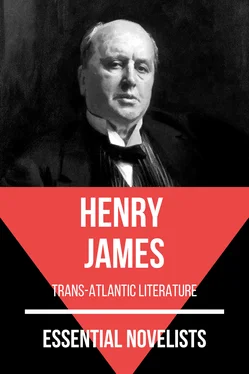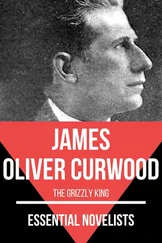“I’m sorry for that; I liked him,” said Isabel.
“Why, it seemed to me that you barely spoke to him,” Ralph objected.
“Never mind, I like him all the same. I like your father too, immensely.”
“You can’t do better than that. He’s the dearest of the dear.”
“I’m so sorry he is ill,” said Isabel.
“You must help me to nurse him; you ought to be a good nurse.”
“I don’t think I am; I’ve been told I’m not; I’m said to have too many theories. But you haven’t told me about the ghost,” she added.
Ralph, however, gave no heed to this observation. “You like my father and you like Lord Warburton. I infer also that you like my mother.”
“I like your mother very much, because—because—” And Isabel found herself attempting to assign a reason for her affection for Mrs. Touchett.
“Ah, we never know why!” said her companion, laughing.
“I always know why,” the girl answered. “It’s because she doesn’t expect one to like her. She doesn’t care whether one does or not.”
“So you adore her—out of perversity? Well, I take greatly after my mother,” said Ralph.
“I don’t believe you do at all. You wish people to like you, and you try to make them do it.”
“Good heavens, how you see through one!” he cried with a dismay that was not altogether jocular.
“But I like you all the same,” his cousin went on. “The way to clinch the matter will be to show me the ghost.”
Ralph shook his head sadly. “I might show it to you, but you’d never see it. The privilege isn’t given to every one; it’s not enviable. It has never been seen by a young, happy, innocent person like you. You must have suffered first, have suffered greatly, have gained some miserable knowledge. In that way your eyes are opened to it. I saw it long ago,” said Ralph.
“I told you just now I’m very fond of knowledge,” Isabel answered.
“Yes, of happy knowledge—of pleasant knowledge. But you haven’t suffered, and you’re not made to suffer. I hope you’ll never see the ghost!”
She had listened to him attentively, with a smile on her lips, but with a certain gravity in her eyes. Charming as he found her, she had struck him as rather presumptuous—indeed it was a part of her charm; and he wondered what she would say. “I’m not afraid, you know,” she said: which seemed quite presumptuous enough.
“You’re not afraid of suffering?”
“Yes, I’m afraid of suffering. But I’m not afraid of ghosts. And I think people suffer too easily,” she added.
“I don’t believe you do,” said Ralph, looking at her with his hands in his pockets.
“I don’t think that’s a fault,” she answered. “It’s not absolutely necessary to suffer; we were not made for that.”
“You were not, certainly.”
“I’m not speaking of myself.” And she wandered off a little.
“No, it isn’t a fault,” said her cousin. “It’s a merit to be strong.”
“Only, if you don’t suffer they call you hard,” Isabel remarked.
They passed out of the smaller drawing-room, into which they had returned from the gallery, and paused in the hall, at the foot of the staircase. Here Ralph presented his companion with her bedroom candle, which he had taken from a niche. “Never mind what they call you. When you do suffer they call you an idiot. The great point’s to be as happy as possible.”
She looked at him a little; she had taken her candle and placed her foot on the oaken stair. “Well,” she said, “that’s what I came to Europe for, to be as happy as possible. Good-night.”
“Good-night! I wish you all success, and shall be very glad to contribute to it!”
She turned away, and he watched her as she slowly ascended. Then, with his hands always in his pockets, he went back to the empty drawing-room.
––––––––

ISABEL ARCHER WAS A young person of many theories; her imagination was remarkably active. It had been her fortune to possess a finer mind than most of the persons among whom her lot was cast; to have a larger perception of surrounding facts and to care for knowledge that was tinged with the unfamiliar. It is true that among her contemporaries she passed for a young woman of extraordinary profundity; for these excellent people never withheld their admiration from a reach of intellect of which they themselves were not conscious, and spoke of Isabel as a prodigy of learning, a creature reported to have read the classic authors—in translations. Her paternal aunt, Mrs. Varian, once spread the rumour that Isabel was writing a book—Mrs. Varian having a reverence for books, and averred that the girl would distinguish herself in print. Mrs. Varian thought highly of literature, for which she entertained that esteem that is connected with a sense of privation. Her own large house, remarkable for its assortment of mosaic tables and decorated ceilings, was unfurnished with a library, and in the way of printed volumes contained nothing but half a dozen novels in paper on a shelf in the apartment of one of the Miss Varians. Practically, Mrs. Varian’s acquaintance with literature was confined to The New York Interviewer; as she very justly said, after you had read the Interviewer you had lost all faith in culture. Her tendency, with this, was rather to keep the Interviewer out of the way of her daughters; she was determined to bring them up properly, and they read nothing at all. Her impression with regard to Isabel’s labours was quite illusory; the girl had never attempted to write a book and had no desire for the laurels of authorship. She had no talent for expression and too little of the consciousness of genius; she only had a general idea that people were right when they treated her as if she were rather superior. Whether or no she were superior, people were right in admiring her if they thought her so; for it seemed to her often that her mind moved more quickly than theirs, and this encouraged an impatience that might easily be confounded with superiority. It may be affirmed without delay that Isabel was probably very liable to the sin of self-esteem; she often surveyed with complacency the field of her own nature; she was in the habit of taking for granted, on scanty evidence, that she was right; she treated herself to occasions of homage. Meanwhile her errors and delusions were frequently such as a biographer interested in preserving the dignity of his subject must shrink from specifying. Her thoughts were a tangle of vague outlines which had never been corrected by the judgement of people speaking with authority. In matters of opinion she had had her own way, and it had led her into a thousand ridiculous zigzags. At moments she discovered she was grotesquely wrong, and then she treated herself to a week of passionate humility. After this she held her head higher than ever again; for it was of no use, she had an unquenchable desire to think well of herself. She had a theory that it was only under this provision life was worth living; that one should be one of the best, should be conscious of a fine organisation (she couldn’t help knowing her organisation was fine), should move in a realm of light, of natural wisdom, of happy impulse, of inspiration gracefully chronic. It was almost as unnecessary to cultivate doubt of one’s self as to cultivate doubt of one’s best friend: one should try to be one’s own best friend and to give one’s self, in this manner, distinguished company. The girl had a certain nobleness of imagination which rendered her a good many services and played her a great many tricks. She spent half her time in thinking of beauty and bravery and magnanimity; she had a fixed determination to regard the world as a place of brightness, of free expansion, of irresistible action: she held it must be detestable to be afraid or ashamed. She had an infinite hope that she should never do anything wrong. She had resented so strongly, after discovering them, her mere errors of feeling (the discovery always made her tremble as if she had escaped from a trap which might have caught her and smothered her) that the chance of inflicting a sensible injury upon another person, presented only as a contingency, caused her at moments to hold her breath. That always struck her as the worst thing that could happen to her. On the whole, reflectively, she was in no uncertainty about the things that were wrong. She had no love of their look, but when she fixed them hard she recognised them. It was wrong to be mean, to be jealous, to be false, to be cruel; she had seen very little of the evil of the world, but she had seen women who lied and who tried to hurt each other. Seeing such things had quickened her high spirit; it seemed indecent not to scorn them. Of course the danger of a high spirit was the danger of inconsistency—the danger of keeping up the flag after the place has surrendered; a sort of behaviour so crooked as to be almost a dishonour to the flag. But Isabel, who knew little of the sorts of artillery to which young women are exposed, flattered herself that such contradictions would never be noted in her own conduct. Her life should always be in harmony with the most pleasing impression she should produce; she would be what she appeared, and she would appear what she was. Sometimes she went so far as to wish that she might find herself some day in a difficult position, so that she should have the pleasure of being as heroic as the occasion demanded. Altogether, with her meagre knowledge, her inflated ideals, her confidence at once innocent and dogmatic, her temper at once exacting and indulgent, her mixture of curiosity and fastidiousness, of vivacity and indifference, her desire to look very well and to be if possible even better, her determination to see, to try, to know, her combination of the delicate, desultory, flame-like spirit and the eager and personal creature of conditions: she would be an easy victim of scientific criticism if she were not intended to awaken on the reader’s part an impulse more tender and more purely expectant.
Читать дальше













